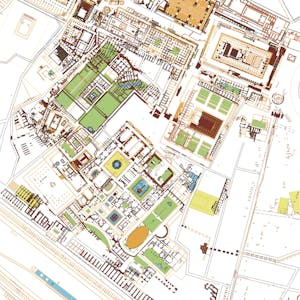Paesaggi di Roma Antica. Archeologia e storia del Palatino.
The course presents the topographical lay-out of the most relevant part of the city. Research developed on the Palatine since the end of last century by the team of Sapienza Classical Archaeologists opened a new phase in the urban archaeological investigation and in the scientific debate about the relation between archaeological features and literary tradition as well as the “correct use“ of both kind of evidence, key issues of wide archaeological and historical significance.Students will be introduced to methods and procedures developed and successfully applied by Sapienza School of Classical Archaeology in collection, analyses, integration and interpretation of complex and multi-stratified contexts, including actual methods and innovative instruments based on a deep archaeological and historical knowledge but also on ICT technologies.
The course will introduce students to the way we have been reflecting on over the last twenty years and still are engaged with the study of the past of our cities, beginning from the most complex case in the ancient Mediterranean World: the core of Italy and of Roman Empire. On the other hand, knowledge means also preservation and defense of material remains and cultural memory.
None
Syllabus
Syllabus - What you will learn from this course
Week 1
Dalle rovine a una storia locale globaleA(metodi, procedure, strumenti)
Week 2
Da una terra di confine al più grande insediamento del Lazio (13° - 9° secolo a.C.).
Week 3
Nasce una città governata da re (8° - 7° secolo a.C.).
Week 4
Nuovi re prima di un nuovo Stato (6° - 3° secolo a.C.). Lezioni.
Week 5
I padroni di un impero (2° - fine del 1° secolo a.C.).
Week 6
La Capitale dell’Impero (fine del 1° secolo a.C. – inizi del 1° secolo d.C.)
Week 7
La città d’oro (1° - 2° secolo d.C.).
Week 8
La città d’oro e il suo declino (3° – 6° secolo d.C.).
FAQ
When will I have access to the lectures and assignments?
Access to lectures and assignments depends on your type of enrollment. If you take a course in audit mode, you will be able to see most course materials for free. To access graded assignments and to earn a Certificate, you will need to purchase the Certificate experience, during or after your audit. If you don't see the audit option:
What will I get if I purchase the Certificate?
When you purchase a Certificate you get access to all course materials, including graded assignments. Upon completing the course, your electronic Certificate will be added to your Accomplishments page - from there, you can print your Certificate or add it to your LinkedIn profile. If you only want to read and view the course content, you can audit the course for free.
Is financial aid available?
Yes. In select learning programs, you can apply for financial aid or a scholarship if you can’t afford the enrollment fee. If fin aid or scholarship is available for your learning program selection, you’ll find a link to apply on the description page.
Reviews
Corso eccellente in una cornice suggestiva cosi' evocativa di più' di mille anni di storia cosi' ben narrati dal prof. Carafa, auspico una maggiore presenza della Sapienza su questa piattaforma.
Better video editing and map views would have make it a perfect course.
Corso molto interessante e coinvolgente! Spero che, a breve, ne verranno fatti altri :-)
It was a very interesting course which let me to explore really well the Roman Archeology!
